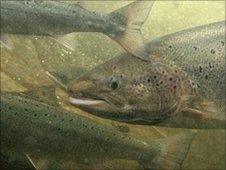Scottish salmon scheme nets nature award
- Published

The project has tried to improve the habitat of Atlantic salmon
A scheme to improve fish stocks on a number of Scottish rivers has earned a European nature award.
The Conservation of Atlantic Salmon in Scotland (CASS) project was one of five recognised for its work.
It was set up to improve the habitat of fish on eight rivers around the country - the Tweed, Dee, South Esk, Tay, Spey, Moriston, Bladnoch and Oykel.
Scottish Natural Heritage said the scheme had seen groups "pulling together to reach a common goal".
The works of CASS were honoured by LIFE, a European Commission programme that supports environmental and nature conservation projects.
The other four schemes recognised were based in Sweden, Portugal and Austria.
Denise Reed of SNH said: "Scotland is a stronghold for the Atlantic salmon in Europe and several of our rivers rank among the most famous for salmon fishing in the world.
"From both conservation and a fisheries perspective, it was vital to work together to do what we could to stop the decline of salmon."
Exceeded objectives
Nick Yonge, clerk to the River Tweed Commission, said its support from CASS had proved invaluable.
"The CASS award allowed the Tweed Foundation to make much needed improvements to an old fish pass in the otherwise impassable dam on the Gala Water at Galashiels," he said.
"The changes to the inlet and the outlet of the pass allow fish to migrate more readily and, with a new fish counter installed, every fish going up or downstream can be logged by video.
"This is a crucial management tool for Atlantic salmon and other migratory fish, enabling the number, size and run time of each species to be recorded."
Angelo Salsi, the head of the LIFE nature unit said the CASS project showed what a "dedicated partnership" could do to reverse the decline in biodiversity.
"It exceeded its objectives, reopening over 150km of rivers to the Atlantic salmon," he said.
"As a result, salmon are now returning to rivers where they have not been seen for as much as 250 years."